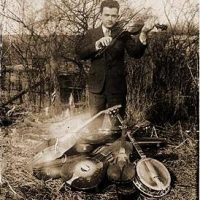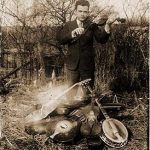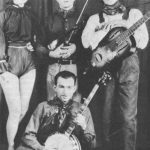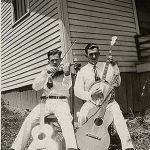
Frank Blevins
Fiddler Frank Blevins recorded eight sides for Columbia records at 16-years-old, with his brother Ed and Fred Miller on banjo, waxing his stamp on the early Country music recording era.
Frank Blevins was the youngest of eight children, and he grew up along little Horse Creek on a farm in Ashe County, North Carolina. His father, Avery, was an accomplished fiddler who played on an instrument that was handed down for generations in the family. By the time he was six-years-old, Frank started teaching himself fiddle, and a hunting accident as a 12-year-old gave him extra resting time to hone his skills. Frank’s brother Ed was his companion and musical partner, and they built a repertoire together playing for local dances and events. Frank became known as “the kid fiddler.”
According to Blue Ridge music historian, Marty McGee, “Between 1926 and 1929, the Blevins Brothers played professionally around northwestern North Carolina, southwestern Virginia, and eastern Tennessee.” The brothers frequently played with Fred Miller, who was also from Ashe County. Miller played banjo, having learned on a homemade fretless instrument as a boy. The three auditioned for a representative for Columbia music in West Jefferson, North Carolina, and they were subsequently invited to Atlanta to record for the Columbia Record Company.
On their first recording session, November 8, 1927, the trio recorded six sides, including two original songs from Frank Blevins – “I’ve Got No Honey Babe Now” and “Old Aunt Betsy.” Blevins fiddled and sang on the session, and the group was so lively that one of the Columbia employees said, “I ain’t never heard such a rattlin’ bunch!” Famed Columbia A&R man, Frank B. Walker, gave titled the group “Frank Blevins and His Tar Heel Rattlers” on the record labels. The group was paid $450 for the session, plus travel expenses for the multi-day journey to Atlanta.
The group had one more recording session, on April 17, 1928, when they cut four more sides, including “Don’t Get Trouble in Your Mind” and “Nine Pound Hammer” which were both released. While these records were not major sellers for Columbia, they are regarded as prime examples of a southern Blue Ridge string band of the era.
Music historian and record producer, Marshall Wyatt says these records “rank among the finest examples of traditional southern music ever preserved on wax. Frank’s fiddling is powerful and expressive and his singing is surprisingly visceral for a boy of 16. Ed’s guitar provides flawless accents for his brother’s fiddling, reflecting a lifetime of playing together, and Fred’s banjo reinforces the compelling rhythm that drives these classic performances. The music of the Tar Heel Rattlers epitomizes the golden era of rural music that existed before the Depression, an era that still valued honesty and self-expression over commercial success.”
After the Depression, the Blevins brothers moved to Marion, Virginia to work in the furniture industry. They continued to perform occasionally in the area with Jack Reedy and Corwin Matthews as Southern Buccaneers, playing in theaters and participating in the famed 1933 White Top Folk Festival. First Lady Eleanor Roosevelt attended the event and presented Blevins with two blue ribbons. In the early 1940s, Frank Blevins mostly gave up fiddling, after the untimely deaths of his brother and Jack Reedy within two years of each other. Blevins continued working in the furniture industry until retiring in the mid-1960s and opening his own furniture plant with his sons in eastern Tennessee.





